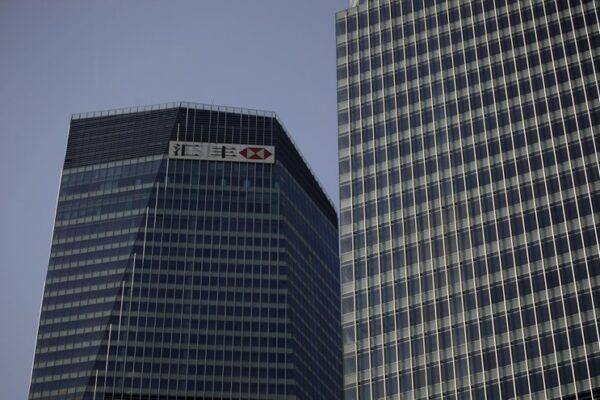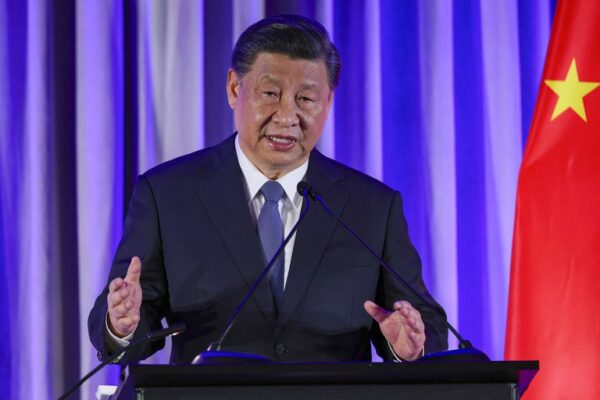One year after crowds of protesters across China held up blank sheets of paper, chanting slogans calling for an end to the zero-COVID policy and for Communist Party leader Xi Jinping to step down, activists overseas vowed to keep the flame of the “white paper” revolution alive, despite attempts by Beijing to scare them away. While authorities in China moved quickly to quash the protests, arresting a number of young people for taking part, some managed to leave China, joining others who were already expressing their support on the streets of cities around the world, sometimes risking retaliation against their families back home. One of those overseas supporters was Apple, of the dissident group China Deviants, who was in touch with the protesters in real time via Telegram, and who organized a rally to mark the anniversary of their resistance in London this week. “On one voice call, a girl got busted right in the middle of the call,” Apple told Radio Free Asia. “People in the group were shouting ‘That girl got busted!’ and I was on the other end of the phone in London.” “I was thinking, ‘Oh my gosh! I really wish I could help her and bring her back’,” she recalled. Instead, she got active right where she was, taking to the streets of London to oppose Chinese Communist Party rule. The “white paper” protests were sparked by public anger at the delayed response to a deadly fire on Nov. 24 in Urumqi, capital of the Xinjiang Uyghur Autonomous Region, that was widely blamed on COVID-19 restrictions. The incident, which left at least 10 people dead, prompted an outpouring of public grief and tapped into pent-up frustrations of millions of Chinese who had endured nearly three years of repeated lockdowns, travel bans, quarantines and various other restrictions to their lives. Apple, a member of the dissident group China Deviants, organized a rally in London this week to mark the one-year anniversary of the White Paper resistance. Credit: Shi Shi But it wasn’t all about calling for an end to lockdowns and mass quarantines. Protesters also voiced calls for greater freedom of expression, democratic reforms, and even the removal of President Xi Jinping, who has been closely identified with the rigid policies. “We want to amplify the voices that have been censored in China overseas, because it’s impossible to have any form of civil society in [today’s] China,” she said. “We want all voices to be included … to be heard.” Fellow China Deviants activist Chen Liangshi said overseas activism is still not risk-free, and that the threat of violence and harassment from “little pink” supporters of Beijing is always there. “There are a lot of little pinks overseas, and I would never know how many people felt the way I did,” Chen said. “But since joining China Deviants, I have found a lot of like-minded friends.” “When we work together for the causes of resisting communist rule, and democracy for China, I feel very excited, and have found a sense of belonging,” he said. Feeling powerless Fellow China Deviants activist Ma Youwei agreed. “It’s very common to feel powerless as a Chinese person living in China,” Ma said. “I wanted to get rid of that feeling.” “How? You do it through action.” Yet the anniversary comes amid growing concern over Beijing’s “long-arm” law enforcement targeting overseas activists and students, who had expected to enjoy greater freedom of speech and association while living or studying in a democratic country. Both Chen and Ma said their families haven’t yet been directly targeted by the Chinese authorities, and insisted on pseudonyms to preserve their anonymity. “This is the way the Chinese Communist Party suppresses the overseas democracy movement,” Chen said. “They try to frighten us into not speaking out or protesting, so they can maintain their totalitarian rule.” “It’s normal to be afraid, but we can’t let that fear stop us, because it runs counter to our values and political ideas,” he said. “We still have to stand up.” Ma Youwei [left], Apple [center] and Chen Liangshi and are members of the China Deviants, a dissident group based in the United Kingdom. Credit: Shi Shi In Canada, Xiaopei recalled using his circumvention tools to go online on the morning of Nov. 27 to see large groups of people gathering on the streets of Shanghai, then heading out on his bicycle to join them. He was later detained at a protest in Shanghai’s Xuhui district, beginning an ordeal of torture and inhumane treatment at the hands of police. “They put my hands behind my back and hit my head against the wall. It was a concrete wall, so my head was bruised,” said Xiaopei, who declined to give his full name. “I protested again inside [the police station], so I was arrested and put on the tiger bench, which is an iron chair,” he said. “My wrists and ankles were all in restraints, and I sat there for more than an hour without being able to move.” Manacles and leg irons Xiaopei was released the following day, but placed under close surveillance, then redetained after taking part in a discussion on Twitter, now X, he said. This time, police put him in manacles and leg irons for 30 days, and was unable to move around freely. “I was in restraints for 30 days … I had problems sleeping, I couldn’t wash or change my clothes by myself, so anyone who monitored me would notice that I smelled bad,” said. “I couldn’t even eat or drink by myself, and I needed help going to the toilet,” he told Radio Free Asia. Xiaopei was eventually released, and decided he was leaving China, and boarded a plane to Canada, where he applied for political asylum. “Ordinary people [in China] are treated like ants and are trampled to death,” he said. “It takes a lot of courage to take part in action [like the white paper movement], and there are huge risks involved.”…






